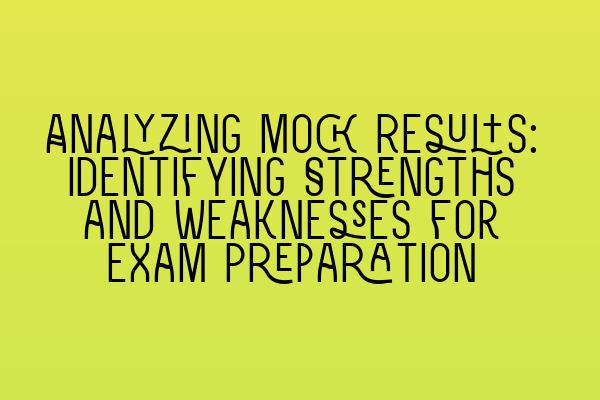Analyzing Mock Results: Identifying Strengths and Weaknesses for Exam Preparation
As you navigate through your journey towards becoming a qualified solicitor, one of the most crucial steps is to thoroughly analyze your mock examination results. Mock exams are an invaluable tool for assessing your strengths and weaknesses, allowing you to understand where you excel and where you need to put in more effort. By dissecting and evaluating your performance in these practice exams, you can better tailor your study plan and maximize your chances of success in the actual exam.
In this article, we will guide you on how to analyze your mock results effectively, enabling you to identify your strengths and weaknesses for efficient exam preparation. We will provide you with expert insights and tips to help you make the most out of this valuable assessment process.
1. Review the Questions: Begin by carefully reviewing each question in the mock exam. Pay attention to the topics covered, the difficulty level, and the format of the questions. Identify the specific areas of law that you struggled with or where you performed exceptionally well. This initial review will help set the foundation for a comprehensive analysis.
2. Evaluate Time Management: Assess your time management skills during the mock exam. Did you complete all the questions within the allocated time? Did you get stuck on any particular question and spend too much time on it? Time management is vital in the actual exam, so understanding how effectively you utilized your time in the mock exam will enable you to optimize your approach for the real thing.
3. Analyze Correct and Incorrect Answers: Compare your answers with the model answers provided and carefully evaluate your correctness. Identify the questions you answered correctly and understand why your response was accurate. Equally important is scrutinizing the questions you answered incorrectly. Determine the reasons behind your incorrect answers, such as insufficient understanding of the law or misinterpretation of the question. This analysis will help you focus on the areas that require additional attention and revision.
4. Look for Patterns: Look for patterns in your correct and incorrect answers. Are there particular topics or types of questions where you consistently excel or struggle? Identifying these patterns will enable you to allocate your study time more efficiently. By recognizing your strengths, you can allocate more time for refreshing your memory on weaker areas. Similarly, by identifying your weaknesses, you can dedicate extra study time to these topics to ensure a better understanding.
5. Seek Further Guidance: If you encounter areas where you consistently struggle or have difficulty understanding, don’t hesitate to seek further guidance. Utilize resources such as study guides, textbooks, or online tutorials to gain a deeper understanding of the law and concepts that challenge you. The related articles below provide helpful insights and tips for specific topics in property practice, which you may find valuable for enhancing your understanding and preparation.
– SQE Prep: Essential Tips and Resources for Success in Property Practice
– Interactive SQE Mock Tests for Property: Sharpen Your Skills for Exam Success
– Joint Ownership: Legal Considerations for Co-Owners of Property
– Commercial Leases: Essential Insights for Business Premises
– Tenant Rights in the UK: Understanding Your Legal Protections
6. Revise and Practice: Armed with the knowledge gained from analyzing your mock results, revise the topics where you need to strengthen your understanding. Use a variety of study resources, including textbooks, flashcards, and online practice tests, to reinforce your knowledge. Regularly incorporate mock exams into your study routine to monitor your progress and identify areas that still need improvement.
By following these steps and implementing a thorough analysis of your mock results, you will be able to fine-tune your exam preparation strategy and focus your efforts on areas that need the most attention. Remember, the goal is not just to pass the exam but to excel and become a competent solicitor.
Good luck with your exam preparation, and may your hard work and dedication pay off in attaining your goal of becoming a qualified solicitor!

Leave a Reply